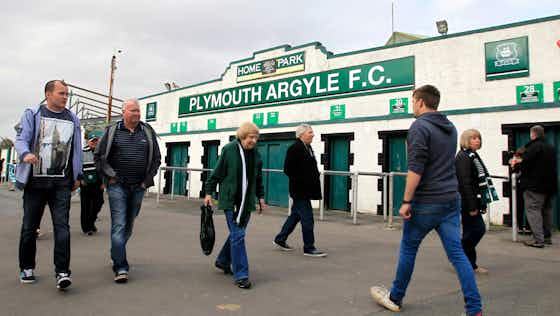Football League World
·10 novembre 2024
Explained: The exact reason why Plymouth Argyle are nicknamed the Pilgrims

Football League World
·10 novembre 2024

The Devon side are steeped in history, ever since their formation in 1886
Plymouth Argyle are a side that have had their fair share of ups and downs over the past few years, with the club dropping from the second tier down to the fourth, before rising all the way back up again.
The arrival of Ryan Lowe helped springboard the side back into League One, before Steven Schumacher finished the job in getting the side back into the Championship in the 22/23 season.
Ian Foster came and went, before Wayne Rooney became the latest man to try and lead the Good Ship Mayflower across the choppy seas, after being given the job in the summer.
The club, just like the city, is steeped in history, so we took a look at how the Pilgrims got their name, with the Football League’s most Southern and most Western club having its own story to tell.
Using the incredibly thorough database of all things Argyle related that is Greens on Screen, we can see that the club were founded in 1886 as Argyle Football Club, after a meeting of friends - including F Howard Grose and Mr W Pettybridge - in the Borough Arms Coffee Tavern in the city.
After playing at various locations, including Marsh Mills in the formative years, the club secured Home Park as their home in 1901, and have played there ever since, although the stadium has seen some vast refurbishment done in that time.
After completing three seated sides around the turn of the Millennium, the Mayflower Stand was done up in recent seasons under the ownership of Simon Hallett, with the unused terrace being transformed to make the stadium an all-seater venue.
It wasn’t until 1903 that the club added the ‘Plymouth’ element to their official team name, but where does the unique appendage ‘Argyle’ come from, I hear you ask?
Well, there are many theories as to why this is, but during the previously mentioned meeting in Borough Arms, the ideas of ‘Pickwick’ or ‘Argyle’ were said to be mooted, with the latter being the one chosen, due to its originality.
The name Argyle is believed to have come from an Argyle Terrace area of the City, although the exact reasoning for this still seems to be unclear, despite turning professional in the years to come, they kept their amateur club name as part of their identity, something a lot of other clubs failed to do.
While we could go on about the green strip, the origin of the word Janners - for which a Plymouth native is known - for hours on end, let's take a look at the Pilgrim nickname, which lends itself to the historical nature of the Ocean City.
Interestingly, the Pilgrims have not always been called so, with the Devon side being called 'The Dandies' earlier in their life as a football club, with former Southampton centre-back C.B. Fry said to have coined the moniker after Argyle defeated his Saints side.
That soon faded into obscurity though, with The Pilgrims tag adopted due to the city's link to the Pilgrim Fathers of 1620, when a group of English settlers travelled to Plymouth, Massachusetts on the Mayflower ship, the very vessel that still adorns the club crest to this day.

Ironically, being a side that have struggled on their travels of late, the Pilgrims originate in an area abundant with tales from afar, whether that be Massachusetts or Carlisle away, there have been a great journey started from the great city.






























































